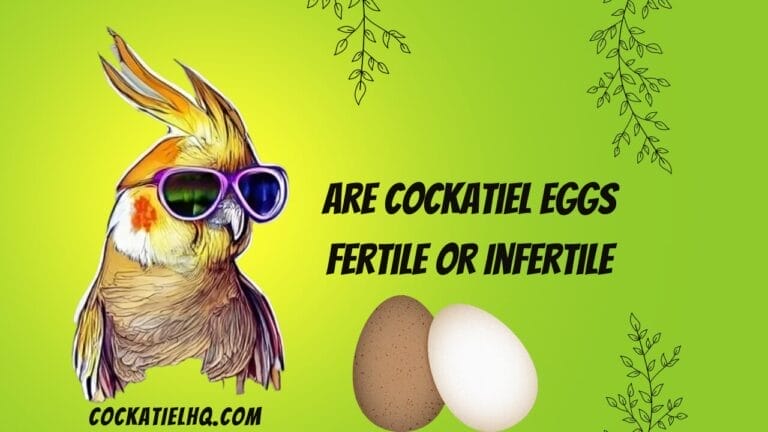What To Do When A Cockatiel Lays An Unfertilized Egg
Understanding Cockatiel Egg Production
The Nature of Unfertilized Eggs in Cockatiels
So, what is an unfertilized egg exactly? Well, similar to humans or any other animal species, cockatiels produce ova or eggs. When an egg is not fertilized by a male, it’s technically called an unfertilized egg. Although you may think this is an unusual occurrence, it’s actually quite common, similar to how human females have a menstrual cycle. It’s Mother Nature’s way of keeping things moving in the animal kingdom.
However, why does a cockatiel, living in your home, lay an unfertilized egg when there’s no male around? This is often influenced by various environmental factors like light exposure, diet, and even the age of your bird.
The Health Implications of Laying Unfertilized Eggs for Cockatiels
Laying an egg, fertilized or not, is a gargantuan task for our little feathered friends. The physical stress it puts on their body can cause various health issues. These may range from simple things like fatigue and lethargy to more serious complications like calcium deficiency, bone weakness, and severe cases of egg binding (which is as scary as it sounds).
The mental health aspect cannot be dismissed either. Laying an egg can induce a sense of motherhood in your little birdie, so laying an unfertilized egg and not having a chick can cause serious stress and anxiety for them. Further, the egg-laying process in itself can be very confusing and stressful for these delicate creatures.
Signs that Your Cockatiel has Laid an Unfertilized Egg
How can you tell when your cockatiel has laid an egg? It’s almost like playing detective! The first giveaways are changes in behavior. Your usually bubbly and active bird might appear more lethargic or nervous. They might also exhibit nesting behaviors, like shredding paper and arranging it in a secluded area of their cage.
As for the physical signs, you might notice your bird appearing broader in the lower abdomen area. They may also start sitting more often and for longer periods, sometimes not coming out of their chosen nesting site at all. Indirect signs could include finding a large, round object in the cage (this could be the egg itself) or noticeable changes in droppings. If you’re intrigued and want to learn more about how to tell if a cockatiel egg is fertile, explore this informative guide on CockatielHQ: How to Tell If a Cockatiel Egg Is Fertile.
Caring for Your Cockatiel After Laying an Unfertilized Egg

Optimal Dietary Requirements Post-Egg Laying
Like when humans do hard labor, your bird needs extra nutrition after laying an egg. Increase their intake of calcium-rich foods like broccoli, kale, or even cuttlebone, as laying an egg significantly depletes the calcium in your bird’s body. Additional supplements of vitamins A, D, and E could also aid recovery.
Providing A Comfortable Environment
Think of your bird like a queen (or indeed a king). Adapt their environment to suit their needs. Keep the noise and disturbances around their cage to a minimum to provide a calm and peaceful environment. Ensure they get ample sleep, as this is when their body will be recovering.
Regular Check-Ups and Monitoring
Stay attentive to your pet’s needs as they may not act like their usual sparkly self. If you notice anything suspicious, such as inactivity, loss of appetite, or changes in droppings, don’t hesitate to seek a vet’s advice during this critical period.
Managing the Unfertilized Eggs
Handling and Removal of the Unfertilized Eggs; What To Do When A Cockatiel Lays An Unfertilized Egg
This is touchy territory (pun intended!). Always be gentle when handling the eggs. Usually, removing the egg after a couple of days is best, to prevent undue stress to your bird.
Assessment and Querying of Frequent Unfertilized Egg Laying
If your bird is resembling a chicken in an egg farm, frequently laying eggs, you should consider professional help. Excessive egg-laying can lead to nutrient deficiencies and other health problems.
Preventative Measures for Unfertilized Eggs
Keeping a good ratio of daylight to nightlight, and controlling their diet can help reduce the frequency of unfertilized egg-laying. Regular veterinary check-ups also can help in early detection and prevention.
How to Respond When Your Cockatiel is Broody

Recognizing the Signs of a Broody Cockatiel
Your bird could get broody when they’re about to or having laid an egg. Watch out for signs, like increased aggression, being clingy towards you and spending extended time in the selected nesting site.
Addressing Broodiness in Cockatiels
To ease broodiness, ensure your bird has access to plenty of their favorite foods and nutritious treats. While being gentle, try not to overindulge their territorial behavior to prevent them from getting too comfortable in this state.
When to Seek Professional Help
If your bird is frequently brooding or seemingly distressed, it might be time to consult a vet. Keep a record of their behaviors before the appointment for more effective consultation.
Emotional Well-being of Your Cockatiel During this Period
Acknowledge and Understand Your Bird’s Emotions
Your bird has just laid an egg, and it’s a confusing process for them. They might have mood swings, become more aggressive, or even seem a bit down. It’s important to stay patient, give them space, and understand what they are going through.
Enhancing Interaction and Affection
Even though your bird needs some space at this time, don’t forget to shower them with love (not literally!). Increased interaction with them can help in lessening their stress. Gentle petting and soothing words can do wonders.
Maintaining Normalcy in your Bird’s Routine
Consistency is key. Even if your bird has stepped into parent-hood (of an unfertilized egg), try to maintain their routine as far as possible to provide a sense of stability.
Summary: What To Do When A Cockatiel Lays An Unfertilized Egg
Dealing with an unfertilized egg is both a fascinating and challenging experience. Remember, this is equally hard for your bird, so take extra care of them during this period. Keep their diet in check, ensure a peaceful environment for them, and most importantly, love them immensely.
What is the normal frequency for a cockatiel to lay unfertilized eggs?
While it can greatly vary, generally, a healthy cockatiel might lay eggs once to twice a year.
How can I tell if an egg is unfertilized or not?
This can be hard to determine manually. It’s better to assume that the eggs are unfertilized if there’s no male bird in sight for a significant duration.
How can I comfort my bird during this time?
Provide them with a comfortable and peaceful environment. Give them space and time to handle this new phase.
When should I consult a vet about my bird’s condition?
If you notice anything out of the ordinary, such as behavioral changes, loss of appetite or increased aggression – it’s time to check with a vet.
How long does it take for a bird to recover after laying an egg?
A bird usually takes a week or two to return to its normal self. But it can greatly vary, depending on the bird, diet, and the specific situation.

About Me
I’m Kamran, a co-founder and content creator at cockatielhq.com. With 8+ years in the world of avian enthusiasts, I’ve gained extensive knowledge in caring for birds. From egg-laying and mating to cohabitation with other birds, dietary needs, nurturing, and breeding, I’m here at cockatielhq.com to share valuable insights for your avian companions.








2 Comments